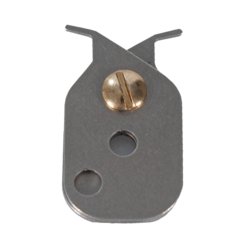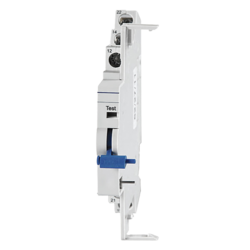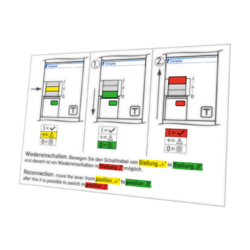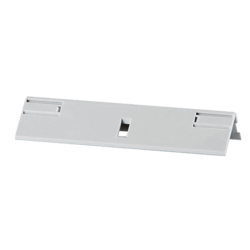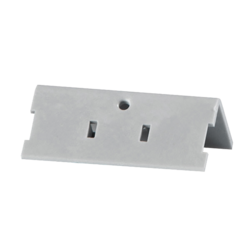residual current circuit-breaker DFS 4 125-4/0,03-A KV Hz400 V115/220
- sensitive to pulsating and alternating currents, mains-voltage-independent
- Rated frequency 150 Hz ... 400 Hz / Rated voltage (AC) 115 V, 220 V
- higher system availability: short-time delayed
- minimal power dissipation at each pole
- large connection terminals up to 50 mm²
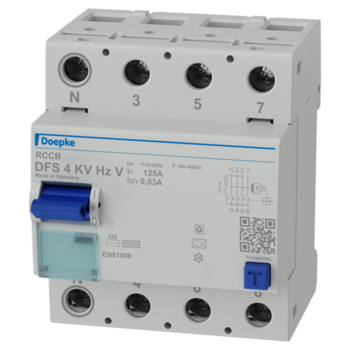

residual current circuit-breaker DFS 4 125-4/0,03-A KV Hz400 V115/220
- sensitive to pulsating and alternating currents, mains-voltage-independent
- Rated frequency 150 Hz ... 400 Hz / Rated voltage (AC) 115 V, 220 V
- higher system availability: short-time delayed
- minimal power dissipation at each pole
- large connection terminals up to 50 mm²
Details
Residual current circuit-breakers, four-pole, 125 A, 0,03 A, Type A, 150 Hz ... 400 Hz/115 V, 220 V, short-time delayed, N left
Residual current circuit-breakers (RCCB) switch the power supply off if dangerous high residual currents occur. DFS 4 are two-terminal or two-terminal pair residual current circuit-breakers for single- or three-phase networks. In the standard design, the compact devices are just four module widths wide. They are available with many different residual current types and variants for rated currents up to 125 A. The large two-tier terminals can also accommodate large conductor cross-sections. The trip position of the multi-function toggle switch simplifies fault-finding. The free label software helps in the labelling process. Type A switches are sensitive to pulsating and alternating currents. This function is independent of the mains voltage. Residual current circuit-breakers in the KV design have a response delay, so are much less sensitive to brief pulsed fault currents. This enables them to increase system availability. They can effectively be used instead of a standard switch, as their protective function is completely retained. Residual current circuit-breakers in the Hz design are intended for rated mains frequencies other than 50 Hz. The frequency range for tripping current detection remains unaffected by this. Devices in design V are made for special voltages.
high immunity against surge currents and mains-voltage-operated secondary current impulses , tripping not dependent on mains and auxiliary voltage, sensitive to AC residual currents and pulsating DC residual currents (type A) , compact design for all rated currents, high short-circuit resistance, double-sided two-tier terminals for large conductor cross-section and busbar, switch position indicator, viewing window for labels, multifunction switch toggle with three positions: "on", "off" and "tripped", Neutral conductor position left
quick fastening to mounting rail, any installation position, supply from any direction
Power supplies to residential and purpose-built building as well as industrial facilities with TN-S, TT and TN-C-S networks, in which conventional RCCBs trip following transient leakage currents and this is not desired, such as in systems with long cable lengths behind the RCCB, lighting systems with lots of fluorescent lamps (> 20 lamps), computer systems and solar power systems, Excluded is the application in TN-C systems and for the protection of installations in which electronic equipment could generate smooth DC currents or residual currents with frequencies other than 50 Hz. Comprehensive protection is not provided in this case. For these applications we recommend our AC/DC sensitive residual current circuit-breakers (Type B or B+).
- Operating instructions
- Data sheet
- Prospectus Power for building sites
- Technical information Derating graph for DFS 2/4
- Technical information dissipation power DFS 2/4
- Prospectus Complete RCCB brochure
- Prospectus Circuit-breaker overview
- Prospectus Modern residual current protection type F / A KV
- Prospectus DFS HD "heavy duty"
- Dimensional drawing Group view
- STEP file
- Wiring diagram
- Labelling software DFS / DLS
Residual current circuit-breakers, four-pole, 125 A, 0,03 A, Type A, 150 Hz ... 400 Hz/115 V, 220 V, short-time delayed, N left
Residual current circuit-breakers (RCCB) switch the power supply off if dangerous high residual currents occur. DFS 4 are two-terminal or two-terminal pair residual current circuit-breakers for single- or three-phase networks. In the standard design, the compact devices are just four module widths wide. They are available with many different residual current types and variants for rated currents up to 125 A. The large two-tier terminals can also accommodate large conductor cross-sections. The trip position of the multi-function toggle switch simplifies fault-finding. The free label software helps in the labelling process. Type A switches are sensitive to pulsating and alternating currents. This function is independent of the mains voltage. Residual current circuit-breakers in the KV design have a response delay, so are much less sensitive to brief pulsed fault currents. This enables them to increase system availability. They can effectively be used instead of a standard switch, as their protective function is completely retained. Residual current circuit-breakers in the Hz design are intended for rated mains frequencies other than 50 Hz. The frequency range for tripping current detection remains unaffected by this. Devices in design V are made for special voltages.
high immunity against surge currents and mains-voltage-operated secondary current impulses , tripping not dependent on mains and auxiliary voltage, sensitive to AC residual currents and pulsating DC residual currents (type A) , compact design for all rated currents, high short-circuit resistance, double-sided two-tier terminals for large conductor cross-section and busbar, switch position indicator, viewing window for labels, multifunction switch toggle with three positions: "on", "off" and "tripped", Neutral conductor position left
quick fastening to mounting rail, any installation position, supply from any direction
Power supplies to residential and purpose-built building as well as industrial facilities with TN-S, TT and TN-C-S networks, in which conventional RCCBs trip following transient leakage currents and this is not desired, such as in systems with long cable lengths behind the RCCB, lighting systems with lots of fluorescent lamps (> 20 lamps), computer systems and solar power systems, Excluded is the application in TN-C systems and for the protection of installations in which electronic equipment could generate smooth DC currents or residual currents with frequencies other than 50 Hz. Comprehensive protection is not provided in this case. For these applications we recommend our AC/DC sensitive residual current circuit-breakers (Type B or B+).
- Operating instructions
- Data sheet
- Prospectus Power for building sites
- Technical information Derating graph for DFS 2/4
- Technical information dissipation power DFS 2/4
- Prospectus Complete RCCB brochure
- Prospectus Circuit-breaker overview
- Prospectus Modern residual current protection type F / A KV
- Prospectus DFS HD "heavy duty"
- Dimensional drawing Group view
- STEP file
- Wiring diagram
- Labelling software DFS / DLS

